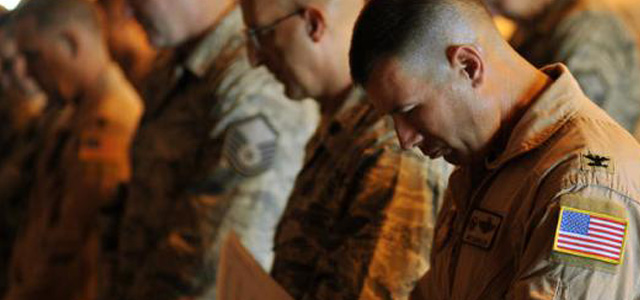Notice: Trying to get property 'post_date' of non-object in /home/military/public_html/wordpress/wp-content/plugins/custom-content-shortcode/includes/modules/if.php on line 465
HUFFINGTON POST – A Spiritually Transformed Military with Ambassadors for Christ in Uniform

photo credit: defenseimagery.mil
This article was originally published by The Huffington Post.
Throughout the U.S. military, with chapters on virtually every military installation worldwide, lurks an organization of over 15,500 fundamentalist Christian military officers who think their real duty is not to protect and defend the Constitution, but to raise up “a spiritually transformed military, with ambassadors for Christ in uniform, empowered by the Holy Spirit.” These officers belong to an organization called the Officers’ Christian Fellowship (OCF), and range in rank from future officers in ROTC and at the U.S. military’s service academies to generals and admirals.
Unlike the other fundamentalist Christian para-church military ministries, which employ retired military personnel to be their “insiders,” about 80 percent of OCF members are true insiders. They are current military officers, many of them commanders with authority over large numbers of service members and even entire bases and larger commands.
When people ask why our service members don’t just complain through military channels about religious issues, and instead come to the Military Religious Freedom Foundation (MRFF) for help, our answer is usually just to say that these service members are afraid to go to their military superiors. Most people, however, probably don’t understand why so many service members have this fear of going to their superiors and filing formal complaints, so I thought a little more of an explanation might be helpful, and explaining a bit about OCF is a good place to start.
Imagine for a moment that you’re a service member whose entire unit just received an email blast from your superior officer on your official military email, with the subject line “Why We Serve.” You open that email to find a lengthy religious message that ends with the following:
“We are blessed to be able, through our lives in the military, to demonstrate the message of salvation to those who have not heard or received it. It was by God’s grace through faith that we were brought fully into His family and presence. Our love for Him motivates us to serve Him in our military, to serve and work for our families, and to serve and work to enable the message of salvation to reach those who have yet to accept Him as Lord and Savior. As Jesus spoke in the Gospel of John.
“Whoever has my commands and obeys them, he is the one who loves me. He who loves me will be loved by my Father, and I too will love him and show myself to him (John 14:21).”
You know that it is completely inappropriate and against military policy for your superior to be using official email to send religious messages to their subordinates. You want to report the officer who is sending out emails like this, but who do you report them to? Your chain of command, right? But wait, the first link in your chain of command is the officer who just sent out the email. And if you go file a complaint through other military channels, it’ll get back to the officer who sent the email, who has the power to make your life miserable. See the problem?
(The above was a real situation reported to MRFF. The content of the email titled “Why We Serve” was an essay from the OCF website, written by a retired 3-star general and past OCF president.)
What if you’re being hounded by one of the fundamentalist Christian para-church ministries on your base? You know it’s wrong for your superiors to be allowing people from this ministry to invade your barracks to “encourage” you to attend their next Bible study. But it’s your chain of command who are allowing this, so they must approve of it, and you’re smart enough to realize that complaining to the very people who are allowing this to happen would be a very stupid move, especially if you are a soldier in a basic or other training situation. The last thing you want to do is stand out as being non-religious or of the “wrong” religion.
Now, what if you happen to be young service member with the guts to step up and complain about what this para-church ministry is doing? Well, you could go to your unit’s chaplain, right? Chaplains have the authority to stop the activities of an outside religious group. But, of course, it was probably your chaplain who invited them there in the first place, so they’re not likely to take your complaint too seriously.
So, who else has the power to stop these civilian “missionaries” from trying to save you? Well, your commanding officer. But what if your commanding officer is a member of the OCF? Well, then you’re kind of out of luck because the OCF endorses and supports the work of para-church military ministries like Campus Crusade for Christ’s Military Ministry, which has come right out and said that their goal is to turn the U.S. military into a force of “government paid missionaries for Christ” and “evangelize and disciple all enlisted members of the U.S. military,” and Cadence International, which preys specifically on young service members in training who are likely to be facing deployment soon, stating as a reason for their success, “Deployment and possibly deadly combat are ever-present possibilities. They are shaken. Shaken people are usually more ready to hear about God than those who are at ease, making them more responsive to the gospel.”
If you’re a service member who has the misfortune of having an OCF member somewhere in their chain of command, you’re probably already fighting a losing battle, and with about 12,400 current officers in the OCF (80% of their total membership) in a military that has about 240,000 officers, the odds of any given chain of command having at least one OCF member in it are fairly high.
How much help can a service member who has a complaint about being proselytized by a superior, chaplain, or para-church ministry expect from an officer who’s an OCF member? Let’s look at some statements from OCF’s latest batch of nominees for the organization’s council positions. Reading some of these statements should give everybody a pretty good idea of the OCF’s attitute towards the Constitution, and their desire to circumvent it to convert the military.
“The main challenge is to continuously strive to advance the kingdom of Christ to ensure a godly America in a hostile world that continues to reject and resist the truth of Jesus Christ and his Holy Word.”
“OCF faces a challenge that is critical to our nation’s military health–the “challenge of balance” — assisting chaplains and military personnel in keeping the First Amendment from becoming an idol of religious authority.”
“In a society and military community that increasingly leans towards secularism and political correctness, how does OCF aggressively proclaim the gospel of Jesus Christ so that everyone has a life changing experience with God?”
OCF “must permeate the ranks and enlarge our membership and presence in the military.”
And my favorite:
“I think the most important issue facing OCF is the growing fear and reticence among many Christian officers to live out their faith and present biblical truth to those they lead. Many officers are afraid to acknowledge their faith in Jesus in private and many more will never publicly stand up for their faith based upon a fear of offending or violating the uniform code of military justice, command policy or regulations.”
U.S. miltary officers who are afraid of “violating the uniform code of military justice, command policy or regulations” by publicly espousing their religious views is a problem? To the rest of us that’s a solution!
As already mentioned, OCF members range in rank from cadets to generals, so I’ll end this with a quote from an OCF council nominee who was “saved” by OCF while at the Air Force Academy, and one from a 2-star Marine general, a former Catholic who doesn’t seem too fond of Catholics (who, of course, aren’t “real” Christians).
This is from the “Personal Testimony” section of the OCF council campaign pitch of Major Warren “Blair” Watkinson II, who was saved by OCF from his heresy of accepting religious pluralism while at the Air Force Academy.
“Though I grew up attending church every week, by the time I was in college, I had developed post-modern views, believing there were many ways to heaven. God used the Air Force Academy OCF cadet ministry and leaders to lovingly confront my heresy and make me aware of my need for a Savior.”
And this is from the “Personal Testimony” section of Major General Melvin G. Spiese’s OCF council campaign pitch, in which he publicly calls Catholicism, the religion of about 25 percent of the military, “obedience to a dead Lord.”
“I was a practicing Catholic and changed to Anglicanism as an adult. I met all church rituals duties and obligations. While attending a chapel sponsored program hosted by COL King Coffman, I was questioned of my faith and challenged to make a non-ritual profession on the altar of the main Protestant chapel. I did, and it changed my life as I finally understood and met the living Lord — a step beyond obedience to a dead Lord.”
Recent Posts
- April 25, 2024 | No comments
- April 21, 2024 | 1 comment
- April 15, 2024 | No comments





Biased, unsubstantiated, drivel. Every story has two sides. Only one side represented here.
Never once in 26 years (1983-2009) of active duty did I ever recieve a “convert or die” e-mail from a commander, first sergeant, or supervisor. Nothing more than inflammatory “the sky is falling” drivel in this “report”.
It is easy to set up a scarecrow and knock it down. It really doesn’t take much effort at all. Not to mention all the assumptions that are in this article. Very poorly written. Not even a good try.
I am not in the military, but I have friends that tell me about the constant subtle and not-so-subtle accidental as-well-as deliberate attempts to favor protestantism over Catholicism and Christianity over anything-else.
Something as simple as having a Christian invocation at the beginning of a mandatory meeting is discriminatory. And that happens constantly.
My friends tell me that this wasn’t a problem until about 2005. I suspect that’s when most of GW Bush’s appointees from Regent University got settled.